Unit 2 Text I Neat people 原文与翻译
新标准大学英语2综合教程课文翻译

第一单元大学已经不再特别了有这么一种说法:“要是你能记得20 世纪60 年代的任何事情,你就没有真正经历过那段岁月。
”对于在大麻烟雾中度过大学时光的那些人,这话可能是真的。
但是,20 世纪60 年代有一件事人人都记得,那就是:上大学是你一生中最激动人心、最刺激的经历。
20 世纪60 年代,加州的高校把本州变成了世界第七大经济实体。
然而,加州大学的主校园伯克利分校也以学生示威、罢课以及激进的政治氛围而著名。
1966 年,罗纳德·里根竞选加州州长,他问加州是否允许“一所伟大的大学被喧闹的、持不一意见的少数人征服。
”自由派人士回答说,大学之所以伟大正是因为它们有能力容忍喧闹的、持不同意见的少数人。
在欧洲的大学校园里,大学生以新的姿态和激情地投入到自由和正义的事业中去,大规模的社会主义或共产主义运动引发了他们与当权者之间日益升级的暴力冲突。
许多抗议是针对越南战争的。
可是在法国,巴黎大学的学生与工会联盟,发动了一场大罢工,最终导致了戴高乐总统辞职。
20 世纪60 年代大学生活的特点并不仅仅是激进的行动。
不论在什么地方,上大学都意味着你初次品尝真正自由的滋味,初次品尝深更半夜在宿舍或学生活动室里讨论人生意义的滋味。
你往往得上了大学才得以阅读你的第一本禁书,看你的第一部独立影人电影,或者找到和你一样痴迷吉米·亨德里克斯或伦尼·布鲁斯的志同道合者。
那是一段难以想象的自由时光,你一生中最无拘无束的时光。
可如今那份激情哪儿去了?大学怎么了?现在,政治、社会和创造意识的觉醒似乎不是凭借大学的助力,而是冲破其阻力才发生的。
当然,一点不假,高等教育仍然重要。
例如,在英国,布莱尔首相几乎实现了到2010 年让50%的30 岁以下的人上大学的目标,(即使愤世嫉俗的人会说,这是要把他们排除在失业统计数据之外)。
不过,大学教育已不再是全民重视的话题了。
如今,大学被视为人们急于逃离的一种小城镇。
有些人辍学,但大多数已经有些麻木,还是坚持混到毕业,因为离开学校实在是太费事了。
综合英语二册课文翻译unit2-unit9

UNIT2同感是怎样表露的1霍普才九个月大,一见到另一个婴儿摔倒,泪水就涌了出来。
她爬到妈妈身边寻求安慰,就好像是她自己摔疼了。
15个月大的迈克尔去把自己的玩具熊拿来给正在大哭的朋友保罗;保罗不停地大哭的时候,迈克尔替保罗捡回他的安乐毯。
这些小小的表示同情和关爱的举动都是接受过记录同感行为训练的母亲们观察到的。
这项研究的结果表明,同感的根源可以追溯到人的婴儿期。
实际上,从出生的那天起,婴儿在听到其他婴儿哭闹的时候就会感到不安——有些人认为这种反应是同感的最初先兆。
2成长心理学家发现,甚至在充分意识到自己是独立于其他人而存在之前,婴儿就感受到了同情的苦恼。
甚至在出生后几个月,婴儿就会对周围人的烦躁不安做出反应,就好像他们自己的烦躁不安一样,看到别的孩子哭也跟着哭。
到了一岁左右,他们开始意识到痛苦不是他们的,而是别人的,可是他们对这样的事情似乎还是感到不知所措。
例如,在纽约大学的马丁·L.霍夫曼所做的一项研究中,一个一岁的孩子把自己的妈妈拉过来安慰哭闹的朋友,却忽视了同在一室的朋友的妈妈。
这样的困惑在其他一岁大的孩子身上也能看到,他们模仿别的孩子的痛苦,也许是为了更好地理解他们的感受。
例如,如果别的婴儿伤了手指,一个一岁大的孩子就会把自己的手指放进嘴里,看看自己是否也感觉到痛。
看到自己的妈妈哭,婴儿即使没有眼泪,也会擦拭自己的眼睛。
3这种所谓的运动神经模仿就是“同感”的原始字面含义,而“同感”这个词于20世纪20年代由美国心理学家E.B.铁钦纳首次使用。
铁钦纳的理论是:同感发自对他人痛苦的一种身体模仿;这种模仿继而在自身引起同样的心理感受。
他当时在寻找一个与同情有所区别的词;同情是针对他人的一般困境而发的,无须分担他人的任何感受。
4小孩两岁半左右就渐渐不再有运动神经模仿行为,那时他们会意识到别人的痛苦与自己的不同,会更有能力安慰别人。
下面是摘自一位母亲日记里的典型事例:5邻居家的婴儿哭了,珍妮走上前去,试图给他一些小甜饼。
全新版大学英语第二版综合教程2课文译文

BOOK2课文译文UNIT 1TextA中国式的学习风格1987年春,我和妻子埃伦带着我们18个月的儿子本杰明在繁忙的中国东部城市南京住了一个月,同时考察中国幼儿园和小学的艺术教育情况。
然而,我和埃伦获得的有关中美教育观念差异的最难忘的体验并非来自课堂,而是来自我们在南京期间寓居的金陵饭店堂。
我们的房门钥匙系在一块标有房间号的大塑料板上。
酒店鼓励客人外出时留下钥匙,可以交给服务员,也可以从一个槽口塞入钥匙箱。
由于口子狭小,你得留神将钥匙放准位置才塞得进去。
本杰明爱拿着钥匙走来走去,边走边用力摇晃着。
他还喜欢试着把钥匙往槽口里塞。
由于他还年幼,不太明白得把钥匙放准位置才成,因此总塞不进去。
本杰明一点也不在意。
他从钥匙声响中得到的乐趣大概跟他偶尔把钥匙成功地塞进槽口而获得的乐趣一样多。
我和埃伦都满不在乎,任由本杰明拿着钥匙在钥匙箱槽口鼓捣。
他的探索行为似乎并无任何害处。
但我很快就观察到一个有趣的现象。
饭店里任何一个中国工作人员若在近旁,都会走过来看着本杰明,见他初试失败,便都会试图帮忙。
他们会轻轻握牢本杰明的手,直接将它引向钥匙槽口,进行必要的重新定位,并帮他把钥匙插入槽口。
然后那位“老师”会有所期待地对着我和埃伦微笑,似乎等着我们说声谢谢——偶尔他会微微皱眉,似乎觉得我俩没有尽到当父母的责任。
我很快意识到,这件小事与我们在中国要做的工作直接相关:考察儿童早期教育(尤其是艺术教育)的方式,揭示中国人对创造性活动的态度。
因此,不久我就在与中国教育工作者讨论时谈起了钥匙槽口一事。
两种不同的学习方式我的中国同行,除了少数几个人外,对此事的态度与金陵饭店工作人员一样。
既然大人知道怎么把钥匙塞进槽口——这是走近槽口的最终目的,既然孩子还很年幼,还没有灵巧到可以独自完成要做的动作,让他自己瞎折腾会有什么好处呢?他很有可能会灰心丧气发脾气——这当然不是所希望的结果。
为什么不教他怎么做呢?他会高兴,他还能早些学会做这件事,进而去学做更复杂的事,如开门,或索要钥匙——这两件事到时候同样可以(也应该)示范给他看。
大学英语通识教程第二册 Unit 2 参考译文

【第二单元·Text A 参考译文】无车生活快乐多多今年夏天,我的家庭(我妻子、我、六个孩子)终于放弃了我们的汽车。
这是一种自由舒畅的却又有些让人担心的经历。
我们已经依赖汽车那么多年,所以放弃它似乎无法想象。
如果你也有一辆车,可能你也会觉得无法想象没有车的生活。
我们无论去哪都开车:上学放学,上班下班,去上音乐课和朗诵会,去足球训练,以及在足球场全天候的做游戏,参加家庭聚会(这样的事数不胜数),去杂货店和购物中心,去餐馆,去影剧院,书店,美容美发沙龙(不是为我,我是秃头...呃刮刮即可)去付账单,为别人跑腿,去海滩和公园,任何事都得开车。
怎样才能摆脱我们的汽车呢?能不开车就不开车最近这几年,我们一直在慢慢减少用车。
(实际上我们有一辆微型货车)我们逐步地开始不用车,如果你也在考虑放弃车,这就是我给你的建议。
首先我们卖掉了我们的第二辆车,尝试用一辆就可以让生活运转。
一度我妻子辞掉了工作,开始在家里教育孩子们,这很好,因为他们的妈妈总是在家里陪伴着他们--这是大多数孩子都享受不到的。
后来我能够辞掉白天的工作,在家上班,尽可能地减少驾车旅行。
然后我们搬到了离市区近的地方,这样我们可以更多地步行或走路。
所有的事情都在步行可以到达的范围内:包括杂货店、美容美发沙龙、邮局、海滩、电影院和剧场、餐馆、咖啡店,还有其他更多地方。
只有家庭聚会和足球训练还比较远。
我们很少用到车了。
最后,我们搬到了旧金山,它强大的公共交通系统成为我们不用车的重要因素。
我们正在逐步放弃用车!注意:尽管其他城市的公共交通不像旧金山这么有利,但也有很多人通过步行、或者骑自行车以及和别人共用一辆车等来实现无车的生活。
我们的无车生活我们卖掉了小货车(耶!)在旧金山没有再买车。
有那么几次我们或租或借,哦天,这几次经历让我感到没有车是多么地幸运。
开车真是件麻烦事,你得找地方停车、有时违规停车被发罚单(我就拿过),当车被拖走后你得再拿回你的车,(这样的事情发生过,我无话可说。
unit1neatpeoplevs.sloppypeople原文与翻译
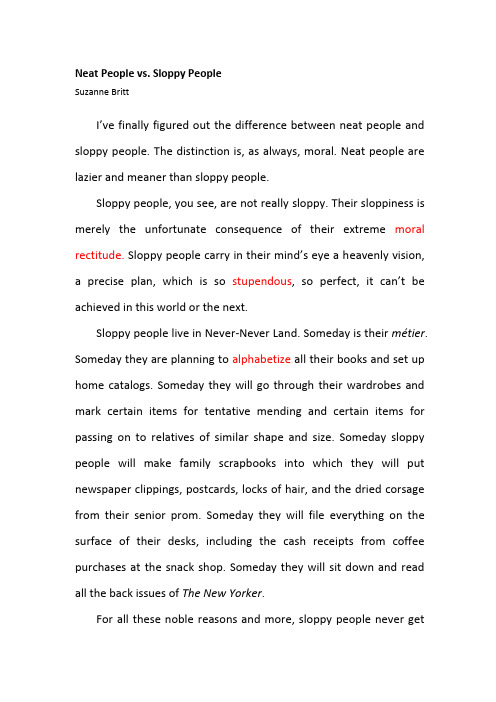
Neat People vs. Sloppy PeopleSuzanne BrittI’ve finally figured out the difference between neat people and sloppy people. The distinction is, as always, moral. Neat people are lazier and meaner than sloppy people.Sloppy people, you see, are not really sloppy. Their sloppiness is merely the unfortunate consequence of their extreme moral rectitude.Sloppy people carry in their mind’s eye a h eavenly vision, a precise plan, which is so stupendous, so perfect, it can’t be achieved in this world or the next.Sloppy people live in Never-Never Land. Someday is their métier. Someday they are planning to alphabetize all their books and set up home catalogs. Someday they will go through their wardrobes and mark certain items for tentative mending and certain items for passing on to relatives of similar shape and size. Someday sloppy people will make family scrapbooks into which they will put newspaper clippings, postcards, locks of hair, and the dried corsage from their senior prom. Someday they will file everything on the surface of their desks, including the cash receipts from coffee purchases at the snack shop. Someday they will sit down and read all the back issues of The New Yorker.For all these noble reasons and more, sloppy people never getneat. They aim too high and wide. They save everything, planning someday to file order and straighten out the world. But while these ambitious plans take clearer and clearer shape in their heads, the books spill from the shelves onto the floor, the clothes pile up in the hamper and closet, the family mementos accumulate in every drawer, the surface of the desk is buried under mounds of paper and the unread magazines threaten to reach the ceiling.Sloppy people can’t bear to part with anything. They give loving attention to every detail. When sloppy people say they’re going to tackle the surface of a desk, they really mean it. Not a paper will go unturned; not a rubber band橡皮筋will go unboxed. Four hours or two weeks into the excavation, the desk looks exactly the same, primarily because the sloppy person is meticulously creating new piles of papers with new headings and scrupulously stopping to read all the old book catalogs before he throws them away. A neat person would just bulldoze the desk.Neat people are bums and clods at heart. They have cavalier attitudes toward possessions, including family heirlooms. Everything is just another dust-catcher to them. If anything collects dust, it’s got to go and that’s that. Neat people will toy with the idea of throwing the children out of the house just to cut down the clutter.Neat people don’t care about process. They like results. Whatthey want to do is get the whole thing over with so they can sit down and watch the rasslin’ on TV. Neat people operate on two unvarying principles: Never handle any item twice, and throw everything away.The only thing messy in a neat person’s house is the trash can. The minute something comes to a neat person’s hand, he will look at it, try to decide if it has immediate use and, finding none, throw it in the trash.Neat people are especially vicious with mail. They never go through their mail unless they are standing directly over a trash can. If the trash can is beside the mailbox, even better. All ads, catalogs, pleas for charitable contributions, church bulletins and money-saving coupons go straight into the trash can without being opened. All letters from home, postcards from Europe, bills and paychecks are opened, immediately responded to, then dropped in the trash can. Neat people keep their receipts only for tax purposes. That’s it. No sentimental salvaging of birthday cards or the last letter of a dying relative ever wrote. Into the trash it goes.Neat people place neatness above everything, even economics. They are incredibly wasteful. Neat people throw away several toys every time they walk through the den. I knew a neat person once who threw away a perfectly good dish drainer because it had moldon it. The drainer was too much trouble to wash. And neat people sell their furniture when they move. They will sell a La-Z-Boy recliner while you are reclining in it.Neat people are no good to borrow from. Neat people buy everything in expensive little single portions. They get their flour and sugar in two-pound bags. They wouldn’t consider clipping a coupon, saving leftover, reusing plastic non-dairy不含牛奶的;没有乳制品whipped cream n. 生奶油containers or rinsing off tin foil and draping it over the unmold dish drainer. You can never borrow a neat person’s newspaper to see what’s playing at the movies. Neat people have the paper all wadded up and in the trash by 7:05 a.m.Neat people cut a clean swath through the organic as well as the inorganic world. People, animals, and things are all one to them. They are so insensitive. After they’ve finished with the pantry, the medicine cabinet, and the attic, they will throw out the red geranium英 [dʒɪ'reɪnɪəm] n. 天竺葵(too many leaves), sell the dog (too many fleas), and send the children off to boarding school (too many scuffmarks on the hardwood floors).整洁人与邋遢人苏珊娜·布里特我终于悟出了整洁人和邋遢人的区别。
Unit2TextINeatpeople原文与翻译

Neat People vs. Sloppy PeopleSuzanne BrittI’ve finally figured out the difference between neat people and sloppy people. The distinction is, as always, moral. Neat people are lazier and meaner than sloppy people.Sloppy people, you see, are not really sloppy. Their sloppiness is merely the unfortunate consequence of their extreme moral rectitude. Sloppy people carry in their mind’s eye a h eavenly vision, a precise plan, which is so stupendous, so perfect, it can’t be achieved in this world or the next.Sloppy people live in Never-Never Land. Someday is their métier. Someday they are planning to alphabetize all their books and set up home catalogs. Someday they will go through their wardrobes and mark certain items for tentative mending and certain items for passing on to relatives of similar shape and size. Someday sloppy people will make family scrapbooks into which they will put newspaper clippings, postcards, locks of hair, and the dried corsage from their senior prom. Someday they will file everything on the surface of their desks, including the cash receipts from coffee purchases at the snack shop. Someday they will sit down and read all the back issues of The New Yorker.For all these noble reasons and more, sloppy people never get neat. They aim too high and wide. They save everything, planningsomeday to file order and straighten out the world. But while these ambitious plans take clearer and clearer shape in their heads, the books spill from the shelves onto the floor, the clothes pile up in the hamper and closet, the family mementos accumulate in every drawer, the surface of the desk is buried under mounds of paper and the unread magazines threaten to reach the ceiling.Sloppy people can’t bear to part with anything. They give loving attention to every detail. When sloppy people say they’re going to tackle the surface of a desk, they really mean it. Not a paper will go unturned; not a rubber band橡皮筋will go unboxed. Four hours or two weeks into the excavation, the desk looks exactly the same, primarily because the sloppy person is meticulously creating new piles of papers with new headings and scrupulously stopping to read all the old book catalogs before he throws them away. A neat person would just bulldoze the desk.Neat people are bums and clods at heart. They have cavalier attitudes toward possessions, including family heirlooms. Everything is just another dust-catcher to them. If anything collects dust, it’s got to go and that’s that. Neat people will toy with the idea of throwing the children out of the house just to cut down the clutter.Neat people don’t care about process. They like results. What they want to do is get the whole thing over with so they can sit downand watch the rasslin’ on TV. Neat people operate on two unvarying principles: Never handle any item twice, and throw everything away.The only thing messy in a neat person’s house is the trash can. The minute something comes to a neat person’s hand, he will look at it, try to decide if it has immediate use and, finding none, throw it in the trash.Neat people are especially vicious with mail. They never go through their mail unless they are standing directly over a trash can. If the trash can is beside the mailbox, even better. All ads, catalogs, pleas for charitable contributions, church bulletins and money-saving coupons go straight into the trash can without being opened. All letters from home, postcards from Europe, bills and paychecks are opened, immediately responded to, then dropped in the trash can. Neat people keep the ir receipts only for tax purposes. That’s it. No sentimental salvaging of birthday cards or the last letter of a dying relative ever wrote. Into the trash it goes.Neat people place neatness above everything, even economics. They are incredibly wasteful. Neat people throw away several toys every time they walk through the den. I knew a neat person once who threw away a perfectly good dish drainer because it had mold on it. The drainer was too much trouble to wash. And neat people sell their furniture when they move. They will sell a La-Z-Boy recliner whileyou are reclining in it.Neat people are no good to borrow from. Neat people buy everything in expensive little single portions. They get their flour and sugar in two-pound bags. They wouldn’t consider c lipping a coupon, saving leftover, reusing plastic non-dairy不含牛奶的;没有乳制品whipped cream n. 生奶油containers or rinsing off tin foil and draping it over the unmold dish drainer. You can never borrow a neat person’s newspaper to see what’s playing at the movies. Neat people have the paper all wadded up and in the trash by 7:05 a.m.Neat people cut a clean swath through the organic as well as the inorganic world. People, animals, and things are all one to them. They are so insensitive. After they’ve finished with the pantry, the medicine cabinet, and the attic, they will throw out the red geranium 英 [dʒɪ'reɪnɪəm] n. 天竺葵(too many leaves), sell the dog (too many fleas), and send the children off to boarding school (too many scuffmarks on the hardwood floors).整洁人与邋遢人苏珊娜·布里特我终于悟出了整洁人和邋遢人的区别。
(完整版)人教版高中英语必修二课文翻译.doc

第一单元文化遗产阅读一寻找琥珀普鲁士国王腓特烈· 威廉一世从未想过他送个普鲁士人民伟大的礼物会有一点如此惊奇的历史。
这个礼物是因为由几吨琥珀制成而命名的琥珀屋。
这些被挑选的琥珀都有着像蜂蜜一样漂亮的黄棕色。
这间屋的设计是当时最流行的奇特的风格。
这同样是一件花了当时最好的艺术家大约十年用黄金和珠宝修饰制成的宝物。
事实上,这间屋不是制来当礼物的。
这是为腓特烈一世的领土而设计的。
然而,普鲁士下一任国王同样是琥珀屋的拥有者,腓特烈威廉一世决定不保留琥珀屋。
在1716 年他把琥珀屋送给了彼得大帝。
作为报答,沙皇给了腓特烈一队他最好的士兵。
因此琥珀屋成为了沙皇避寒圣地圣彼得堡的一部分。
琥珀屋作为一个大概四米长的只为重要访客的小接待处。
后来,叶卡捷琳娜二世把琥珀屋在圣彼得堡之外的一个她避暑的地方。
她让她的艺术家加了跟多的细节在里面。
在1770 年琥珀屋完全成了她想要的样子。
接近600 只蜡烛在屋内燃烧着,把镜子和图画都照得像金子一样。
令人伤心的,虽然被誉为是世界奇迹之一的琥珀屋现在丢失了。
在 1941 年 9 月,纳粹军队在圣彼得堡附近。
这正是两个国家在交战的时候。
在纳粹去到避暑地方之前,俄国人民能够从琥珀屋里搬走一些家具和小的艺术品。
然而,一些纳粹神秘的偷走了琥珀屋。
至少两天内 100000 多片琥珀被放进27 个木箱里。
这些箱子无疑会被放进一艘去往当时德军驻扎的菠萝的海的哥尼斯堡的船上。
之后,琥珀屋发生了神马仍然是个迷。
最近,俄国和德国人民在避暑的地方制造了一座新的琥珀屋。
通过研究之前的琥珀屋的照片,他们制造了一座新的琥珀屋像旧的那座一样。
在2003 年它被圣彼得堡的人民用来庆祝这座城市的 300 岁生日。
阅读二一个事实还是一个观点神马是事实?是一些人们相信的东西吗?不!事实是可以被证明的任何事。
例如,可以证明中国人口比世界上任何其他国家的人口都要多。
这是一个事实。
那么神马是一个观点?一个观点是人们相信那是真的但还没有被证明的。
新标准大学英语第二册第二单元课文翻译

保持微笑两个月以前,我在一份科普杂志上读到一篇有趣的文章,文章是关于不同文化背景下的人们是如何通过面部表情流露情感的。
文章说,俄国人在面部表情中流露的情感最少——美国人流露的最多。
这似乎非常有趣。
但作为印度人,我觉得更有趣的是,研究人员还研究了哪个国家的人笑得最多。
印度人在排行榜上几乎是垫底的——准确地说,位于第124 名,而丹麦人则居于首位。
这使我想到自己,以及自己的经历。
我记得我的女儿——那时候她肯定是在八岁左右——曾经问我:“爸爸,为什么只有当外国人到家里来的时候你才微笑?”我意识到自己确实像她说的那样。
通常,只有当外国客人来访时我才微笑。
有外国客人时,我会有意识地努力改变我正常的面部表情。
从女儿提醒我之后,我决定开始更多地微笑,在家里这样,上班也一样。
起初,我得强迫自己微笑。
我记得在什么地方读到过,我们皱眉的时候比微笑的时候动用的肌肉要多得多。
可是我们依然需要努力才会微笑——那是一种习得的行为,而不是一种反射动作。
但令人奇怪的是,只要我拉起嘴角的肌肉,就觉得快乐。
换句话说,面部反应能增强其所表达的情感。
几天前,我乘火车在印度南部旅行。
我身边坐着一位年轻人,为了让我坐得舒服,他挪了挪他的包以便给我腾出更大的地方来。
他挪包的时候,一直在微笑。
随后我们就各自落座,一起(用英语)聊起了各自的情况。
他说,他在欧洲一间科学实验室工作,接着又说,在外国生活的经历改变了他的身体语言和面部表情。
在我到达目的地之前,我们交换了电子邮件地址,并约好以后再见。
我们一见如故——就因为在拥挤的火车上,一位年轻人选择了对陌生人微笑。
(完整)Unit 2 Text I Neat people 原文与翻译
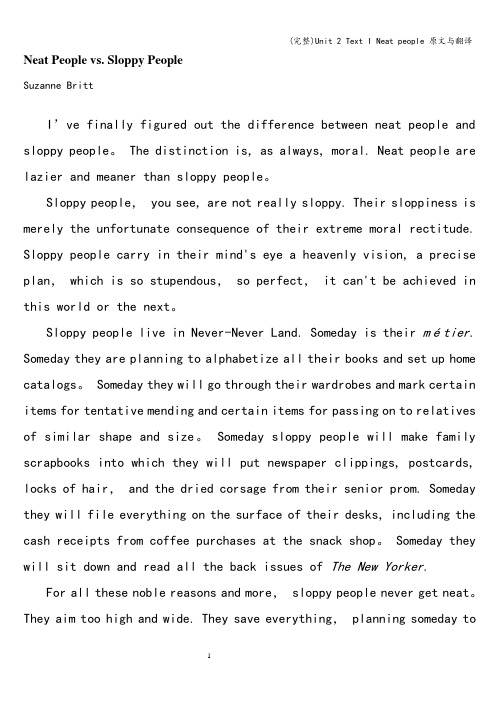
Neat People vs. Sloppy PeopleSuzanne BrittI’ve finally figured out the difference between neat people and sloppy people。
The distinction is, as always, moral. Neat people are lazier and meaner than sloppy people。
Sloppy people, you see, are not really sloppy. Their sloppiness is merely the unfortunate consequence of their extreme moral rectitude. Sloppy people carry in their mind's eye a heavenly vision, a precise plan, which is so stupendous, so perfect, it can't be achieved in this world or the next。
Sloppy people live in Never-Never Land. Someday is their métier. Someday they are planning to alphabetize all their books and set up home catalogs。
Someday they will go through their wardrobes and mark certain items for tentative mending and certain items for passing on to relatives of similar shape and size。
课文参考译文_Unit 2
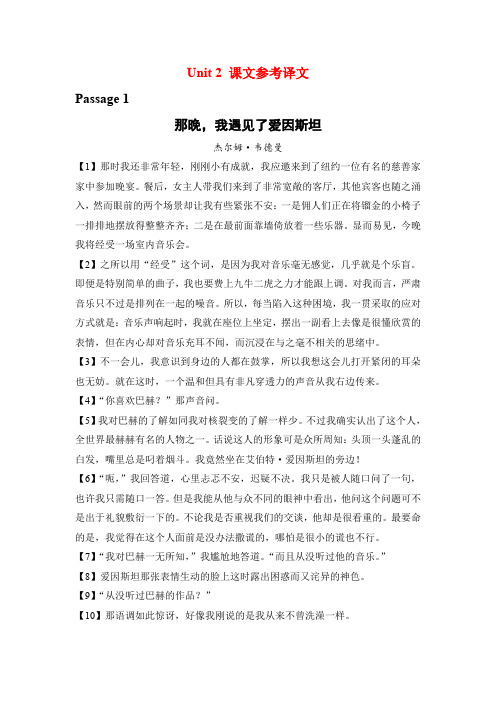
Unit 2 课文参考译文Passage 1那晚,我遇见了爱因斯坦杰尔姆·韦德曼【1】那时我还非常年轻,刚刚小有成就,我应邀来到了纽约一位有名的慈善家家中参加晚宴。
餐后,女主人带我们来到了非常宽敞的客厅,其他宾客也随之涌入,然而眼前的两个场景却让我有些紧张不安:一是佣人们正在将镏金的小椅子一排排地摆放得整整齐齐;二是在最前面靠墙倚放着一些乐器。
显而易见,今晚我将经受一场室内音乐会。
【2】之所以用“经受”这个词,是因为我对音乐毫无感觉,几乎就是个乐盲。
即便是特别简单的曲子,我也要费上九牛二虎之力才能跟上调。
对我而言,严肃音乐只不过是排列在一起的噪音。
所以,每当陷入这种困境,我一贯采取的应对方式就是:音乐声响起时,我就在座位上坐定,摆出一副看上去像是很懂欣赏的表情,但在内心却对音乐充耳不闻,而沉浸在与之毫不相关的思绪中。
【3】不一会儿,我意识到身边的人都在鼓掌,所以我想这会儿打开紧闭的耳朵也无妨。
就在这时,一个温和但具有非凡穿透力的声音从我右边传来。
【4】“你喜欢巴赫?”那声音问。
【5】我对巴赫的了解如同我对核裂变的了解一样少。
不过我确实认出了这个人,全世界最赫赫有名的人物之一。
话说这人的形象可是众所周知:头顶一头蓬乱的白发,嘴里总是叼着烟斗。
我竟然坐在艾伯特·爱因斯坦的旁边!【6】“呃,”我回答道,心里忐忑不安,迟疑不决。
我只是被人随口问了一句,也许我只需随口一答。
但是我能从他与众不同的眼神中看出,他问这个问题可不是出于礼貌敷衍一下的。
不论我是否重视我们的交谈,他却是很看重的。
最要命的是,我觉得在这个人面前是没办法撒谎的,哪怕是很小的谎也不行。
【7】“我对巴赫一无所知,”我尴尬地答道。
“而且从没听过他的音乐。
”【8】爱因斯坦那张表情生动的脸上这时露出困惑而又诧异的神色。
【9】“从没听过巴赫的作品?”【10】那语调如此惊讶,好像我刚说的是我从来不曾洗澡一样。
【11】“我不是不想喜欢巴赫”我匆忙回答。
Unit 2课文译文
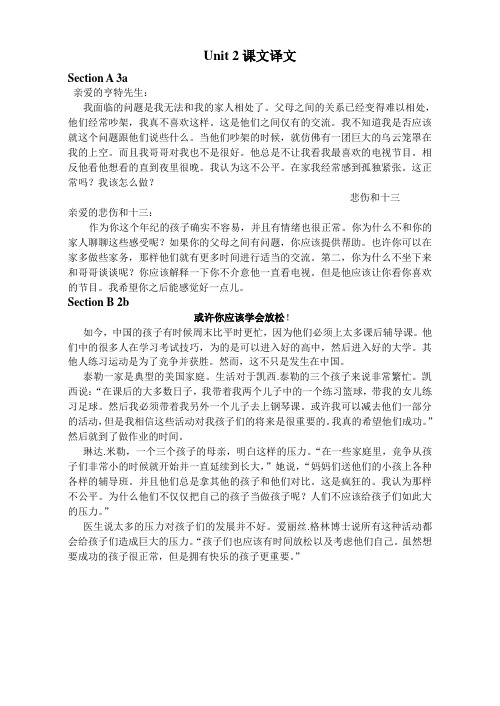
Unit 2课文译文Section A 3a亲爱的亨特先生:我面临的问题是我无法和我的家人相处了。
父母之间的关系已经变得难以相处,他们经常吵架,我真不喜欢这样。
这是他们之间仅有的交流。
我不知道我是否应该就这个问题跟他们说些什么。
当他们吵架的时候,就仿佛有一团巨大的乌云笼罩在我的上空。
而且我哥哥对我也不是很好。
他总是不让我看我最喜欢的电视节目。
相反他看他想看的直到夜里很晚。
我认为这不公平。
在家我经常感到孤独紧张。
这正常吗?我该怎么做?悲伤和十三亲爱的悲伤和十三:作为你这个年纪的孩子确实不容易,并且有情绪也很正常。
你为什么不和你的家人聊聊这些感受呢?如果你的父母之间有问题,你应该提供帮助。
也许你可以在家多做些家务,那样他们就有更多时间进行适当的交流。
第二,你为什么不坐下来和哥哥谈谈呢?你应该解释一下你不介意他一直看电视。
但是他应该让你看你喜欢的节目。
我希望你之后能感觉好一点儿。
Section B 2b或许你应该学会放松!如今,中国的孩子有时候周末比平时更忙,因为他们必须上太多课后辅导课。
他们中的很多人在学习考试技巧,为的是可以进入好的高中,然后进入好的大学。
其他人练习运动是为了竞争并获胜。
然而,这不只是发生在中国。
泰勒一家是典型的美国家庭。
生活对于凯西.泰勒的三个孩子来说非常繁忙。
凯西说:“在课后的大多数日子,我带着我两个儿子中的一个练习篮球,带我的女儿练习足球。
然后我必须带着我另外一个儿子去上钢琴课。
或许我可以减去他们一部分的活动,但是我相信这些活动对我孩子们的将来是很重要的。
我真的希望他们成功。
”然后就到了做作业的时间。
琳达.米勒,一个三个孩子的母亲,明白这样的压力。
“在一些家庭里,竞争从孩子们非常小的时候就开始并一直延续到长大,”她说,“妈妈们送他们的小孩上各种各样的辅导班。
并且他们总是拿其他的孩子和他们对比。
这是疯狂的。
我认为那样不公平。
为什么他们不仅仅把自己的孩子当做孩子呢?人们不应该给孩子们如此大的压力。
课文翻译Unit2
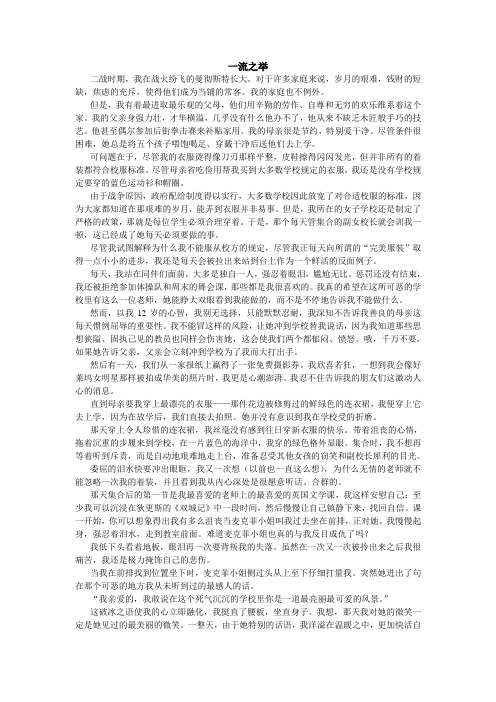
一流之举二战时期,我在战火纷飞的曼彻斯特长大。
对于许多家庭来说,岁月的艰难,钱财的短缺,焦虑的充斥,使得他们成为当铺的常客。
我的家庭也不例外。
但是,我有着最进取最乐观的父母,他们用辛勤的劳作、自尊和无穷的欢乐维系着这个家。
我的父亲身强力壮,才华横溢,几乎没有什么他办不了,他从来不缺乏木匠般手巧的技艺。
他甚至偶尔参加后街拳击赛来补贴家用。
我的母亲很是节约,特别爱干净。
尽管条件很困难,她总是将五个孩子喂饱喝足、穿戴干净后送他们去上学。
可问题在于,尽管我的衣服烫得像刀刃那样平整,皮鞋擦得闪闪发光,但并非所有的着装都符合校服标准。
尽管母亲省吃俭用帮我买到大多数学校规定的衣服,我还是没有学校规定要穿的蓝色运动衫和帽圈。
由于战争原因,政府配给制度得以实行,大多数学校因此放宽了对合适校服的标准,因为大家都知道在那艰难的岁月,能弄到衣服并非易事。
但是,我所在的女子学校还是制定了严格的政策,那就是每位学生必须合理穿着。
于是,那个每天管集合的副女校长就会训我一顿,这已经成了她每天必须要做的事。
尽管我试图解释为什么我不能服从校方的规定,尽管我正每天向所谓的“完美服装”取得一点小小的进步,我还是每天会被拉出来站到台上作为一个鲜活的反面例子。
每天,我站在同伴们面前,大多是独自一人,强忍着眼泪,尴尬无比。
惩罚还没有结束,我还被拒绝参加体操队和周末的舞会课,那些都是我很喜欢的。
我真的希望在这所可恶的学校里有这么一位老师,她能睁大双眼看到我能做的,而不是不停地告诉我不能做什么。
然而,以我12岁的心智,我别无选择,只能默默忍耐,我深知不告诉我善良的母亲这每天惯例屈辱的重要性。
我不能冒这样的风险,让她冲到学校替我说话,因为我知道那些思想狭隘、固执己见的教员也同样会伤害她,这会使我们两个都郁闷、愤怒。
哦,千万不要,如果她告诉父亲,父亲会立刻冲到学校为了我而大打出手。
然后有一天,我们从一家报纸上赢得了一张免费摄影券。
我欣喜若狂,一想到我会像好莱坞女明星那样被拍成华美的照片时,我更是心潮澎湃。
新标准大学英语2课文翻译

新标准大学英语2课文翻译真正的朋友在人的一生中,朋友是非常重要的。
有很多种朋友,但真正的朋友是很难得的。
那么,什么是真正的朋友呢?真正的朋友首先是能够理解你、支持你和鼓励你的人。
无论在何时何地,他们都会站在你的一边,帮助你面对困难和挑战。
他们会给予你信心和力量,让你感到你不是孤单的,你可以依靠他们。
此外,真正的朋友也是能够与你分享快乐和悲伤的人。
他们会与你共同欢笑,分享你的喜悦,也会在你遇到困难时给予你温暖的安慰。
他们会陪伴你共度美好时光,也会在你失落时给予你慰藉。
无论是在成功的时候还是失败的时候,真正的朋友都会与你同在。
另外,真正的朋友也是一个值得信赖的人。
你可以将你的秘密告诉他,因为你知道他永远不会把它告诉别人。
他们会与你共享信任,保护你的隐私。
不同于其他朋友,真正的朋友不在乎你的外貌、背景或者任何其他的表面因素。
他们爱你是因为你是你自己,不管你是什么样子。
他们不会因为你的错误而离开你,而是会帮助你改正错误并继续支持你。
真正的朋友对你的接纳和理解是无条件的。
总之,真正的朋友是那些与你有真正的心灵共鸣的人。
他们会在你需要的时候伸出援手,并与你度过人生的每个阶段。
他们不仅仅是在顺利时出现在你的身边,更是在困难时刻给予你支持的人。
有了真正的朋友,你会感到自己永远不会孤单,你可以与他们分享一切。
所以,在你的生命中,要珍惜真正的朋友。
与他们保持联系,与他们分享你的喜怒哀乐。
他们会使你的生活变得更加美好、有意义。
记住,真正的友谊是不可替代的宝贵财富。
新人教版英语必修二课文的中文翻译

新人教版英语必修二课文的中文翻译本文将为大家介绍新人教版英语必修二课文中各篇文章的中文翻译,共包括7篇文章。
主要内容如下:第一篇:Module 1 Unit 1本篇文章主要介绍了亨利·温兹沃斯,这位享有盛誉的艺术品修复专家的事迹和他为了修复大师级画作所做出的努力。
他的故事鼓励我们敢于追梦,不畏挑战。
第二篇:Module 1 Unit 2本篇文章主要讲述了一个名叫Rosalind Franklin的科学家所做的工作,她是一位杰出的化学家和生物物理学家,为基础科学的发展作出了重要的贡献。
她的故事告诉我们要坚持执着追求真相,不懈努力。
第三篇:Module 2 Unit 1本篇文章主要介绍了一个名叫Moneyless的年轻人,他用一种全新的方式生活:没有钱,依靠与他人分享和交换来获得生活必需品。
他向我们展示了一个全新的人生方式,强调了平等、分享和环保。
第四篇:Module 2 Unit 2本篇文章主要讲述了一个名叫Oscar Wilde的作家的生平事迹,他是英国文学史上最著名的才子佳人之一,被誉为“英国文坛第一翰林”。
他的故事告诉我们要热爱生活、保持乐观,珍惜每一天。
第五篇:Module 3 Unit 1本篇文章主要介绍了印度的一位叫Gandhi的伟大民族英雄。
他是印度独立运动的领袖,主张非暴力和平抗议,影响了世界历史。
他的故事告诉我们要勇敢和坚定地追求自由和平等。
第六篇:Module 3 Unit 2本篇文章主要讲述了美国黑人的领袖Martin Luther King Jr.,他是一位反对种族歧视和贫穷的社会活动家,在美国中起到了重要的作用。
他的故事告诉我们要坚定不移地支持正义和平等。
第七篇:Module 4 Unit 1本篇文章主要介绍了飞行员Amelia Earhart,她是美国历史上著名的女飞行员之一,她在飞行界取得了很多荣誉。
她的故事告诉我们要勇敢和自信,追求自己的梦想,不断挑战自我。
unit2课文翻译
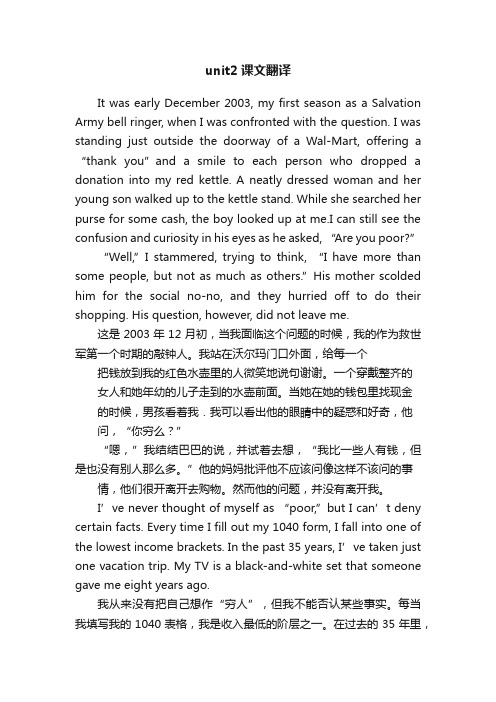
unit2课文翻译It was early December 2003, my first season as a Salvation Army bell ringer, when I was confronted with the question. I was standing just outside the doorway of a Wal-Mart, offering a “thank you”and a smile to each person who dropped a donation into my red kettle. A neatly dressed woman and her young son walked up to the kettle stand. While she searched her purse for some cash, the boy looked up at me.I can still see the conf usion and curiosity in his eyes as he asked, “Are you poor?”“Well,”I stammered, trying to think, “I have more than some people, but not as much as others.”His mother scolded him for the social no-no, and they hurried off to do their shopping. His question, however, did not leave me.这是2003年12月初,当我面临这个问题的时候,我的作为救世军第一个时期的敲钟人。
我站在沃尔玛门口外面,给每一个把钱放到我的红色水壶里的人微笑地说句谢谢。
一个穿戴整齐的女人和她年幼的儿子走到的水壶前面。
新编实用英语第二册课文译文unit

新编实用英语第二册课文译文u n i t2(共1页)--本页仅作为文档封面,使用时请直接删除即可----内页可以根据需求调整合适字体及大小--Unit 2 电子邮件:好处和烦恼电子邮件是一种不需要与电话一样立即答应的会话。
如果有人给你打电话,你拿起电话(除非你有电话答录机、语音留言或者你只是非常粗鲁),会话就开始了。
这是一种互动式的会话。
使用电子邮件时,你发送信息,然后等待回复。
答复可能在5分钟后便到达,也可能在5天后收到。
无论是哪种情况,这都不是互动式的会话。
如果有一天内有一百个人给你发邮件,那有怎么样呢?你不需要和这一百人交谈。
只要想想看,你能省掉的所有“你好”,“再见”以及其他一些没有必要的寒暄,这就够啦。
有了电子邮件,你只需要处理邮件的信息(通常省略了“你好”,“再见”等类似的东西),并且你能根据你自己的时间来处理这些邮件。
这就是电子邮件的好处。
现在看看电子邮件的烦恼有太多电子邮件用户认为,人们一收到电子邮件就会马上阅读。
这种想法是很糟糕的。
如果你计划从现在起的一小时后开会,然后给每一位与会的人发一封电子邮件,所有与会者都能在一小时内读到该邮件的机率是很小的。
此外,如果你计划第二天开会,他们能读到邮件的机率则会很高。
要记住,电子邮件不是用来进行即时应答,而是为了方便(这就是为什么你要有电话)。
有些(但不是所有)电子邮件系统设置了一些功能来设法解决这个问题。
这些功能(通常叫做“告知”功能)会在所有人收到你的邮件时告知你,并且还可能告诉你他何时阅读了邮件(确切的说,这个功能所能做的指示使你明确对方已经看了邮件的首屏——它无法知道那个人是否逐字阅读了邮件信息)。
回到上一段中提到的例子来说,你可以复核一下,了解谁在会议开始之前检视过邮件,然后你可以给没有查看过邮件的人打电话。
附件:表情符号又要电子邮件无法使用面部表情和语音提示,电子邮件的用户就想出了一种称作“表情符号”的办法。
“表情符号”就是一系列简单的符号,在邮件文本中将它们拼合起来,用来帮助表达作者的情感。
现代大学英语精读2第二版课文翻译
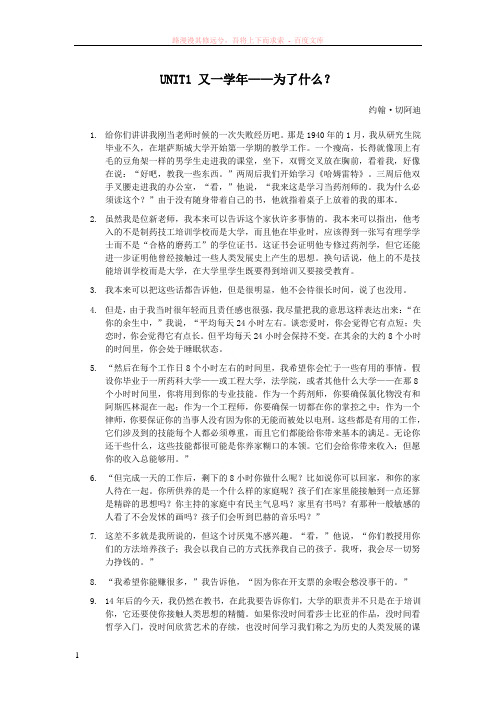
UNIT1 又一学年——为了什么?约翰·切阿迪1.给你们讲讲我刚当老师时候的一次失败经历吧。
那是1940年的1月,我从研究生院毕业不久,在堪萨斯城大学开始第一学期的教学工作。
一个瘦高,长得就像顶上有毛的豆角架一样的男学生走进我的课堂,坐下,双臂交叉放在胸前,看着我,好像在说:“好吧,教我一些东西。
”两周后我们开始学习《哈姆雷特》。
三周后他双手叉腰走进我的办公室,“看,”他说,“我来这是学习当药剂师的。
我为什么必须读这个?”由于没有随身带着自己的书,他就指着桌子上放着的我的那本。
2.虽然我是位新老师,我本来可以告诉这个家伙许多事情的。
我本来可以指出,他考入的不是制药技工培训学校而是大学,而且他在毕业时,应该得到一张写有理学学士而不是“合格的磨药工”的学位证书。
这证书会证明他专修过药剂学,但它还能进一步证明他曾经接触过一些人类发展史上产生的思想。
换句话说,他上的不是技能培训学校而是大学,在大学里学生既要得到培训又要接受教育。
3.我本来可以把这些话都告诉他,但是很明显,他不会待很长时间,说了也没用。
4.但是,由于我当时很年轻而且责任感也很强,我尽量把我的意思这样表达出来:“在你的余生中,”我说,“平均每天24小时左右。
谈恋爱时,你会觉得它有点短;失恋时,你会觉得它有点长。
但平均每天24小时会保持不变。
在其余的大约8个小时的时间里,你会处于睡眠状态。
5.“然后在每个工作日8个小时左右的时间里,我希望你会忙于一些有用的事情。
假设你毕业于一所药科大学——或工程大学,法学院,或者其他什么大学——在那8个小时时间里,你将用到你的专业技能。
作为一个药剂师,你要确保氯化物没有和阿斯匹林混在一起;作为一个工程师,你要确保一切都在你的掌控之中;作为一个律师,你要保证你的当事人没有因为你的无能而被处以电刑。
这些都是有用的工作,它们涉及到的技能每个人都必须尊重,而且它们都能给你带来基本的满足。
无论你还干些什么,这些技能都很可能是你养家糊口的本领。
人教版新目标英语课文翻译八年级下二单元

【最新人教版新目标英语课文翻译八年级下】二单元SectionA图片原文今天就做志愿者吧!帮助打扫城市公园去医院探望生病儿童帮助阻止饥饿我希望能在外面工作你可以帮助打扫城市公园1b这个女孩可以去医院探望生病的孩子使他们高兴起来。
这个男孩可以在食品救济中心分发食物。
这个女孩可以志愿在课外学习活动小组教孩子。
这个男孩可以帮助打扫城市公园。
2b我们需要想出一个计划来告诉人们关于这个城市公园清洁日的事。
清洁日离现在只有两个星期了。
我们不能推迟制订计划了。
我们可以张贴标志牌。
让我们也做一些公告牌吧。
然后我放学后将分发它们。
我们每个人可以给10个学生打电话,请他们过来。
2c我们需要为清洁日打扫城市公园想出一个计划。
我们先吃午饭吧!不,我们需要现在开始。
清洁日离我现在只有两个星期了。
2d 嗨,汤姆。
我正在制订今年夏天在养老院工作的一些计划。
真的吗?我去年夏天在那儿工作了!哦,他们请你帮助做什么了?嗯……像给老人读报,或者只是与他们聊天这样的事。
他们给我讲过去的生活经历和过去是什么样子的。
那听起来很有趣。
是呀,许多的老人都很孤独。
我们应该听他们说话并且照顾他们。
对呀。
我的意思是有一天我们也都会老的。
3a 志愿服务的学生来自河畔中学的马里奥?格林和玛丽?布朗每周放弃几个小时去帮助别人。
马里奥喜欢动物,他想成为一名动物医生。
他每个周六上午志愿在一家动物医院工作。
马里奥相信这能帮助他在将来找到理想的工作。
“这是艰苦的工作”他说,“但是我想学习更多的关于如何照顾动物的知识。
当我看到动物们(病情)渐好,看到它们的主人脸上的喜悦时,我产生出那么一种极强的满足感来。
”玛丽的一名书籍爱好者。
她四岁时就能独自看书了。
去年,她决定参加一个课外阅读活动小组的志愿者的选拔。
她每周仍然在那儿工作一次去帮助孩子们学习阅读。
“这些孩子坐在图书馆里,但是你能从他们的眼中看到他们正在进行的每一本不同的新书之旅。
在这里当志愿者对于我来说是梦想成真。
- 1、下载文档前请自行甄别文档内容的完整性,平台不提供额外的编辑、内容补充、找答案等附加服务。
- 2、"仅部分预览"的文档,不可在线预览部分如存在完整性等问题,可反馈申请退款(可完整预览的文档不适用该条件!)。
- 3、如文档侵犯您的权益,请联系客服反馈,我们会尽快为您处理(人工客服工作时间:9:00-18:30)。
Neat People vs. Sloppy PeopleSuzanne BrittI’ve finally figured out the difference between neat people and sloppy people. The distinction is, as always, moral. Neat people are lazier and meaner than sloppy people.Sloppy people, you see, are not really sloppy. Their sloppiness is merely the unfortunate consequence of their extreme moral rectitude. Sloppy people carry in their mind’s eye a h eavenly vision, a precise plan, which is so stupendous, so perfect, it can’t be achieved in this world or the next.Sloppy people live in Never-Never Land. Someday is their métier. Someday they are planning to alphabetize all their books and set up home catalogs. Someday they will go through their wardrobes and mark certain items for tentative mending and certain items for passing on to relatives of similar shape and size. Someday sloppy people will make family scrapbooks into which they will put newspaper clippings, postcards, locks of hair, and the dried corsage from their senior prom. Someday they will file everything on the surface of their desks, including the cash receipts from coffee purchases at the snack shop. Someday they will sit down and read all the back issues of The New Yorker.For all these noble reasons and more, sloppy people never getneat. They aim too high and wide. They save everything, planning someday to file order and straighten out the world. But while these ambitious plans take clearer and clearer shape in their heads, the books spill from the shelves onto the floor, the clothes pile up in the hamper and closet, the family mementos accumulate in every drawer, the surface of the desk is buried under mounds of paper and the unread magazines threaten to reach the ceiling.Sloppy people can’t bear to part with anything. They give loving attention to every detail. When sloppy people say they’re going to tackle the surface of a desk, they really mean it. Not a paper will go unturned; not a rubber band橡皮筋will go unboxed. Four hours or two weeks into the excavation, the desk looks exactly the same, primarily because the sloppy person is meticulously creating new piles of papers with new headings and scrupulously stopping to read all the old book catalogs before he throws them away. A neat person would just bulldoze the desk.Neat people are bums and clods at heart. They have cavalier attitudes toward possessions, including family heirlooms. Everything is just another dust-catcher to them. If anything co llects dust, it’s got to go and that’s that. Neat people will toy with the idea of throwing the children out of the house just to cut down the clutter.Neat people don’t care about process. They like results. Whatthey want to do is get the whole thing over with so they can sit down and watch the rasslin’ on TV. Neat people operate on two unvarying principles: Never handle any item twice, and throw everything away.The only thing messy in a neat person’s house is the trash can. The minute something comes to a neat person’s hand, he will look at it, try to decide if it has immediate use and, finding none, throw it in the trash.Neat people are especially vicious with mail. They never go through their mail unless they are standing directly over a trash can. If the trash can is beside the mailbox, even better. All ads, catalogs, pleas for charitable contributions, church bulletins and money-saving coupons go straight into the trash can without being opened. All letters from home, postcards from Europe, bills and paychecks are opened, immediately responded to, then dropped in the trash can. Neat people keep their receipts only for tax purposes. That’s it. No sentimental salvaging of birthday cards or the last letter of a dying relative ever wrote. Into the trash it goes.Neat people place neatness above everything, even economics. They are incredibly wasteful. Neat people throw away several toys every time they walk through the den. I knew a neat person once who threw away a perfectly good dish drainer because it had mold on it. The drainer was too much trouble to wash. And neat people sell theirfurniture when they move. They will sell a La-Z-Boy recliner while you are reclining in it.Neat people are no good to borrow from. Neat people buy everything in expensive little single portions. They get their flour and sugar in two-pound bags. They wouldn’t consider clipping a coupon, saving leftover, reusing plastic non-dairy不含牛奶的;没有乳制品whipped cream n. 生奶油containers or rinsing off tin foil and draping it over the unmold dish drainer. You can never borrow a neat person’s newspaper to see what’s playing at the movies. Neat people have the paper all wadded up and in the trash by 7:05 a.m.Neat people cut a clean swath through the organic as well as the inorganic world. People, animals, and things are all one to them. They are so insensitive. After they’ve finished with the pantry, the medicine cabinet, and the attic, they will throw out the red geranium 英 [dʒɪ'reɪnɪəm] n. 天竺葵(too many leaves), sell the dog (too many fleas), and send the children off to boarding school (too many scuffmarks on the hardwood floors).整洁人与邋遢人苏珊娜·布里特我终于悟出了整洁人和邋遢人的区别。
